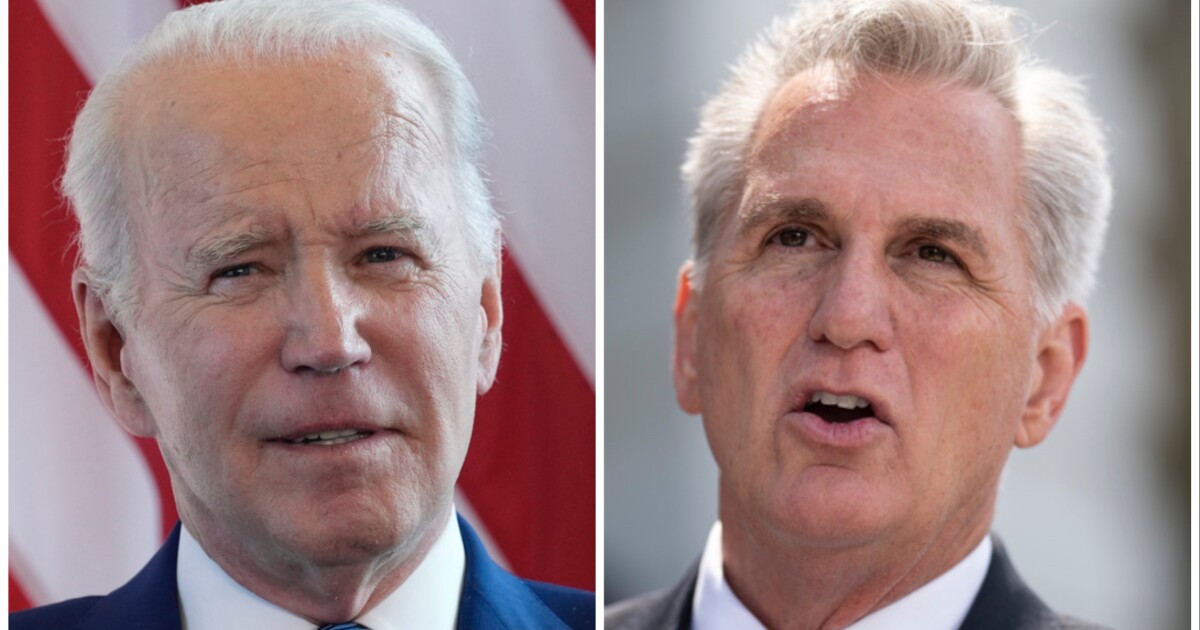

Speaker Kevin McCarthy (R-CA) is planning to work with President Joe Biden on additional energy-permitting reform after Congress turns the page on the debt limit ordeal.
Permitting reform proved to be a major sticking point during deliberations. Although some reform provisions wound up in the final debt ceiling agreement, McCarthy contends that there’s more to do.
BIDEN AND MCCARTHY’S TENTATIVE DEAL RAISES DEBT CEILING UNTIL 2025
“We will continue working with [the White House] and with Democrats across the way because we need energy — all forms of energy, especially for our grid to double in the next future. And so we made a commitment that we’re not stopping now. And that would also deal with transmission. It would deal with pipelines and others,” he said.
Top negotiator Rep. Garret Graves (R-LA) told the Washington Examiner there were some issues on permitting reform where lawmakers “didn’t have mature enough text on or things weren’t ripe enough” yet for the debt limit framework.
Negotiators ticked through some of the key points of their plans for permitting reform featured in the debt limit framework during a press conference Sunday.
“This for the first time in over four decades does transformational changes into the permitting and environmental review process today. It takes over seven years to get a NEPA and environmental analysis for road projects. We’ve narrowed that down to one to two years in this bill,” Graves said during a presser.
The National Environmental Policy Act, NEPA, was passed in the 1970s with the intent of strengthening protections for the environment. Many Republican critics have argued that it has bogged down various infrastructure projects with excessive reviews and protracted wait times.
Graves teased that the reform package will seek to modernize the approval process by beefing up “electronic documents and transparency” so that “you can understand what’s going” and help speed up the process.
Additionally, some types of energy storage that had been left out of Title 41 of the FAST Act to modernize the review process, will now be added, according to Graves, though he did not immediately specify which ones.
Title 41 of the FAST Act, also known as FAST-41, helps establish a “deliberate, transparent, and predictable” review process for “certain large, complex infrastructure projects,” per the Permitting Dashboard for Federal Infrastructure Projects.
Furthermore, lawmakers are seeking to “move forward in a bicameral bipartisan way in really studying” transmission issues, which Graves argued is “not well understood in the Congress.”
White House officials provided Democrats with a rundown of how they interpreted the permitting agreement.
“Accelerates projects through process efficiencies: The agreement codifies, in NEPA, reforms aimed at boosting the coordination, predictability, and certainty associated with federal agency decision-making. The agreement includes provisions to designate a single lead agency, charged with developing a single environmental review document according to a clear and public timeline. The agreement makes these changes without curtailing the substantive scope of NEPA, cutting down the statute of limitations, imposing barriers to standing, or taking away conjunctive relief or other judicial remedies,” the explanation said.
A few conservatives fussed that the permitting reforms in the debt ceiling agreement were insufficient.
“Deficit reduction isn’t even my most important issue. But we didn’t get permitting reform. We didn’t get border security. It’s not entirely clear we got anything,” Sen. J.D. Vance (R-OH) tweeted.
Deficit reduction isn’t even my most important issue. But we didn’t get permitting reform. We didn’t get border security. It’s not entirely clear we got anything.
— J.D. Vance (@JDVance1) May 28, 2023
During the first year of Biden’s administration, permitting reform was raised during the debate on the infrastructure bill. McCarthy noted at the time, that Republicans sought deeper reforms to NEPA.
The issue later came up during the inner Democratic battle to pass Biden’s so-called Build Back Better agenda. Sen. Joe Manchin (D-WV) prodded his party to enact the reforms after he greenlit the Inflation Reduction Act. Despite Biden’s support, the push ultimately faced headwinds from House progressives.
Sen. Kyrsten Sinema (I-AZ) sought to help bridge the gap on permitting reform during the debt ceiling discussions, Axios reported.
CLICK HERE TO READ MORE FROM THE WASHINGTON EXAMINER
McCarthy has vowed to give his members 72 hours to read through the text of the bill.
The debt limit agreement is expected to lift the nation’s borrowing authority for two years in exchange for reductions in spending growth, slightly stronger work requirements, permitting reform, and more. The deadline for a deal is June 5, according to Treasury Secretary Janet Yellen.





